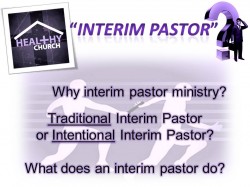

The typical definition …
The word “pastor” usually refers to an ordained leader of a Christian congregation. In some countries the term is used in relation to Protestant churches. It can also be used in reference to priests and bishops within the Catholic, Eastern Orthodox and Oriental Orthodox churches. The word itself is derived from the Latin word pastor which means “shepherd”. The term “pastor” is also related to the role of elder within the New Testament. In the New Testament, the Greek noun poimein and verb poimaino are usually translated shepherd or to shepherd.
Common ideas about what a pastor is and does…
The pastor is traditionally considered a church’s head “everything.” He’s the spiritual and administrative head, the sole minister, the legal corporation president — and basically the know-it-all, do-it-all, “chief cook and bottle washer.” In many small churches, the pastor will conduct all the services, lead the singing, do all the preaching, handle all the visiting, counseling and spiritual matters, while he may also have to take care of the office work, bookkeeping, or even the janitorial, maintenance or building repair.
Many people perceive the pastor as a speaker, administrator of the whims of the people, an employee who belongs to this church, a CEO hired by a group of stockholders rather than a teacher, shepherd, counselor, equipper of other believers who are responsible to do ministry (Eph. 4:11-17).
But Christ and the priorities of Scripture must set the agenda for a pastor’s ministry
When the pastor focuses on finding out what people want (their likes/dislikes, their pet projects, etc.) and bases his duties on their whims and varied expectations, he serves their vested interest and expectations. But, if he serves the Lord, and follows the priorities laid out in scripture, he serves their best interest. Only when he serves Christ can the best interests of people be served.
The leaders of the church are referred to as “elders” (presbuteroi, Acts 20:17; 1 Tim. 5:17), “overseers” (episkopoi, Acts 20:28; Phil. 1:1), “leaders” (proistamenoi, Rom. 12:8; 1 Thess. 5:12), and “pastor/teachers” (poimenas-didaskalous, Eph. 4:11; cf. also Acts 20:28 and 1 Pet. 5:2 with 1 Tim. 3:2, “able to teach,” 5:17b, and Tit. 1:9). Though each of these terms may describe the different aspects of leadership, they seem to be used interchangeably to designate the same office. Above all, as Ephesians 4:11-17 makes clear, they are equippers whose agenda (priorities, allotment of time, and duties) are to be ordered by the Word of God, not by the agendas of people following their cultural expectations set by the traditions of men.
The people of the church are ministers who are to be trained for the kind of growth in the Word that results in changed lives and ministry. Pastors/elders are to be a gifted, trained, and skilled believers whom God has called to lead a group of fellow priests or ministers, not a minister who leads a group of lay spectators.
Read More Here…
- Our Philosophy of ministry (Biblical role of the pastor: scroll down to Part III )
- Our Ministry Perspectives ( see table of contents: “Leadership Style, Developing a team….” )
- See also John MacArthur’s Notes on the Biblical Role of an Elder
![]()
But, the focus of SimmsMinistry website site is not just about the pastoral role, as much as it is about the role of an INTERIM pastor.
What’s an Interim Pastor? (read more)






